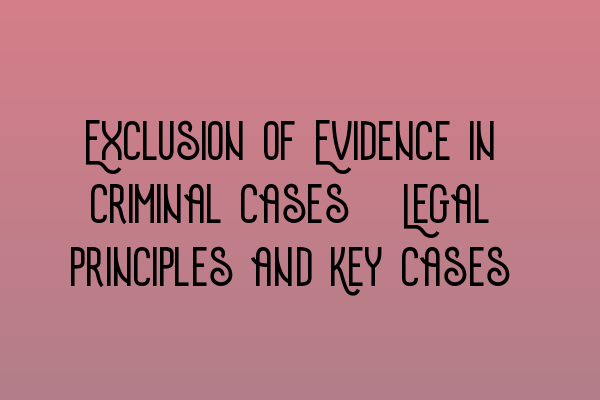Exclusion of Evidence in Criminal Cases: Legal Principles and Key Cases
Introduction:
In criminal cases, evidence plays a crucial role in establishing the guilt or innocence of the accused. However, not all evidence is admissible in court. The exclusion of evidence is a complex legal principle that aims to ensure fairness and protect the rights of the defendant. This blog post will explore the legal principles and key cases surrounding the exclusion of evidence in criminal proceedings.
Legal Principles:
1. The Admissibility of Evidence:
The admissibility of evidence in criminal cases is governed by various legal principles. One such principle is the “relevance” of the evidence. Evidence must be relevant to the issues in dispute and have probative value. Additionally, evidence obtained unlawfully, such as through an illegal search or seizure, may be excluded.
2. The Exclusionary Rule:
The exclusionary rule is a fundamental principle in criminal law that prohibits the use of illegally obtained evidence. This rule aims to deter unlawful police conduct and protect constitutional rights. If evidence is found to be unlawfully obtained, it will likely be excluded from the proceedings.
3. The Fruit of the Poisonous Tree Doctrine:
The fruit of the poisonous tree doctrine is an extension of the exclusionary rule. It states that evidence derived from illegally obtained evidence is also inadmissible. For example, if the police find drugs during an unlawful search, any statements made by the accused as a result of finding those drugs may also be excluded.
4. Section 78 of the Police and Criminal Evidence Act (PACE) 1984:
Section 78 of PACE 1984 provides the court with discretionary powers to exclude evidence if its admission would have an adverse effect on the fairness of the proceedings. This provision allows judges to weigh the importance of the evidence against the prejudice it may cause to the defendant.
Key Cases:
1. R v. Sang, 1980:
In this landmark case, the House of Lords held that evidence obtained through police entrapment should be excluded. The court concluded that police methods that go beyond mere detection to incitement should not be used to secure a conviction.
2. R v. Turnbull, 1977:
The Court of Appeal held that the failure to provide identification evidence, which could have exonerated the accused, amounted to a material irregularity warranting a retrial. This case emphasized the importance of ensuring all relevant evidence is presented in court.
3. R v. Mason, 2016:
The Supreme Court held that evidence obtained through breaches of the European Convention on Human Rights, such as the right to a fair trial, should be excluded. This case confirmed the courts’ commitment to protecting fundamental rights.
Conclusion:
The exclusion of evidence is a fundamental aspect of criminal proceedings. It ensures that only admissible, relevant, and lawfully obtained evidence is presented before the court. Understanding the legal principles and key cases surrounding the exclusion of evidence is crucial for both criminal law practitioners and defendants.
For more information about criminal law and preparation for the SQE exams, check out our related articles:
- SQE 1 Practice Exam Questions
- SQE 1 Practice Mocks FLK1 FLK2
- SQE 2 Preparation Courses
- SQE 1 Preparation Courses
- SRA SQE Exam Dates
Stay informed and stay ahead in your legal career!
